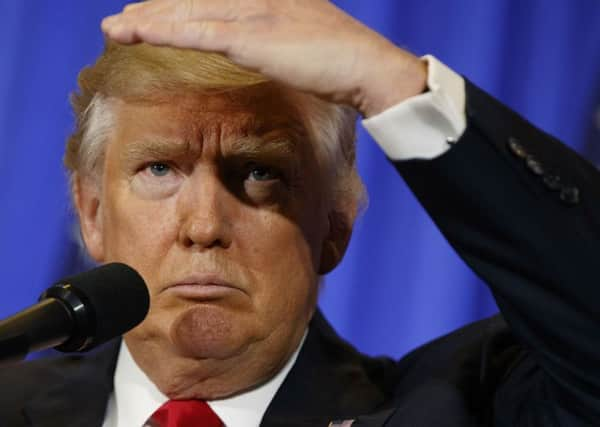Richard Heller: Why President Trump's nemesis will be his own voters


However, Donald J Trump arrives in the Presidency less beholden to donors than most other winners. He raised little more than half the campaign funds of his defeated rival, Hillary Clinton, and was far less reliant on big donors. Trump used his personal wealth as a badge of independence from special interests and he promised loudly and often to end the cosy insiderism of American politics.
Trump has more reason than most Presidents to please the people who voted for him rather than the people who paid for him. So who were those Trump voters? What did they want from him and can he give it to them?
Advertisement
Hide AdAdvertisement
Hide AdTrump’s decisive strength came from older voters, less educated voters and residents of rural areas – those least favoured for interviews by journalists and pollsters. Largely undetected, these so-called Invisible Voters delivered Trump the big states he carried to earn his Electoral College victory, despite losing the popular vote.
During the campaign, Trump exploited their resentment at being ignored and patronised. By often crass methods, he transferred this into loathing of Hillary Clinton, identifying her with a self-seeking elite which worked the political system for their own profit.
But now Trump cannot run against the system. He is in charge of it and must make it work to meet his supporters’ demands.
A profusion of opinion research suggests that these are overwhelmingly domestic. They have little interest in foreign policy. I predict now that Trump will not reach any dramatic accommodation with Vladimir Putin, partly because he cannot afford to look like a weakling and a dupe, but even more because Putin’s corrupt and incompetent regime in Russia has little to offer the American economy. In general, I believe that Trump will do nothing controversial in foreign policy unless it offers specific domestic benefits to his voters.
Advertisement
Hide AdAdvertisement
Hide AdThey want three things in short order. The first is the revival of American manufacturing. Although many lost factory jobs were monotonous, exhausting and unhealthy, Trump’s older voters remember the local factory fondly as a source of security and social status which gave them a pay packet which could support a family of four and a sense of belonging to a stable community. Trump exploited this nostalgia with his coded promise to make America great again. But he has almost no power to restore that kind of job and the way of life that went with it, except by boosting military spending, which he does not want to do and cannot afford.
To revive manufacturing, Trump would have to defy history. Manufacturing represented over a quarter of American jobs in 1960, it is now down to less than 10 per cent. The number of manufacturing jobs peaked in 1979 at 19.5 million and had fallen by nearly 40 per cent by 2015. The decline had many causes, good and bad, which endure and are not within any President’s control. Trump is almost certain to fail to deliver his principal promise. For other reasons, he is equally likely to disappoint his struggling farming supporters.
Trump voters, especially the elderly, want him to meet his promise of a “beautiful alternative” to Obama’s healthcare system. The problem is that he does not have one, beautiful or ugly. Meanwhile, the ideologues in his party want to abolish Obamacare outright, ensuring that tens of millions of Americans would once again lose their hope of any affordable healthcare.
Trump voters also expect him to “drain the swamp” of favouritism and waste in government. But this requires him to confront a Congress he does not control, full of swamp creatures who thrive on favouritism and waste.
Advertisement
Hide AdAdvertisement
Hide AdThe major demands of Trump’s voters would represent huge tasks for a well-organised President with political momentum. Trump has shown himself undisciplined and unfocused and has dissipated all the momentum he gained from his shock victory. During the transition, his supporters have seen no signs of progress on their agenda.
His appointees to government are full of super-rich people who have profited handsomely from the systems he promised to reform. Trump’s supporters have heard almost nothing good about their choice of President – only stupid remarks on Twitter and pointless personal quarrels with celebrities. Whatever the truth about the Russian dossier, Trump has set a macabre record of being embroiled in scandal before he has even been inaugurated. Bill Clinton managed to last a few months in office before the first of his scandals arrived, and Richard Nixon had a whole term before Watergate. Trump has already become the most unpopular President-elect since organised poll ratings began.
I predict that he will repeat this performance in office and that sooner rather than later his approval ratings will fall below the previous record low (which, curiously, belongs to a near-great President, Harry Truman).
The Invisible Voters will speak again when they discover that their supposed champion is not only a nasty piece of work but a non-achiever. I doubt whether Trump, with his thin skin and trigger temper, will cope with their rejection. He may try to divert the wrath by lashing out at enemies, the Congress, the media, immigrants or Muslims. He may even launch some crazed military adventure.
Advertisement
Hide AdAdvertisement
Hide AdThere is already speculation that Trump will not last a full term. Some Washington insiders have been checking the procedures for impeachment and the rules for declaring a President medically unfit for office.
Perhaps Donald Trump will take the decision himself. In a special televised repeat of the programme which made him famous, he will announce: “I’m fired!”
Richard Heller was formerly chief of staff to Denis Healey. He was born in the United States and has reported on four American elections.